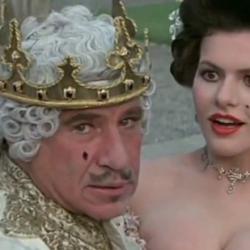It's extremely unlikely that U.S. Attorney General Eric Holder reads this blog, but yesterday he came to exactly the sort of realization we were discussing in the previous post. Finding himself in a position of having to defend an absurd stance, he chose instead to stop, turn around and start over anew.
And so yesterday the attorney general and President Barack Obama let it be known that since the Defense of Marriage Act was indefensible, they would no longer try to defend it.
That's big news. What's most telling here is that this forward-moving reversal arose from the Justice Department, which had been tasked with the unenviable job of providing valid and compelling legal arguments for inequality under the law. Like everyone else who has tried, they found that impossible. And unlike many others who are still trying, they decided to stop faking it and just admit that the Constitution and particularly the 14th Amendment really don't allow for that sort of unequal treatment.
Bravo.
Ed Whelan, president of the cleverly named Ethics and Public Policy Center, spoke for opponents of marriage equality everywhere yesterday on NPR's All Things Considered, saying: "There are lots of reasonable arguments to be offered in defense of the Defense of Marriage Act."
This is what we've come to expect from the incredibly shrinking opposition to marriage equality: 1) the assertion that there are "lots" of excellent, terribly important arguments in support of a legal ban against same-sex couples getting married, and 2) the failure to mention what all those "lots" of excellent, terribly important arguments might actually be.
Nowhere was this made clearer than in the legal battle over California's Proposition 8. U.S. district court Judge Vaughn Walker overturned the state's ban of same-sex marriage and in his decision on the case, Perry v. Schwarzenegger, Walker noted the lack of arguments in support of the ban and its codification of inequality under the law. The judge didn't criticize the substance of Prop 8 proponents' arguments, he simply shook his head at the absence of them.
Attorney David Boies, who successfully argued against Prop 8 in the case, pointed out why this is so:
It's easy to sit around and debate and throw around opinions — appeal to people's fear and prejudice, cite studies that either don't exist or don't say what you say they do. In a court of law you've got to come in and you've got to support those opinions. You've got to stand up under oath and cross-examination. And what we saw at trial is that it's very easy for the people who want to deprive gay and lesbian citizens the right to vote, to make all sorts of statements in campaign literature or in debates where they can't be cross-examined.
But when they come into court and they have to support those opinions and they have to defend those opinions under oath and cross-examination, those opinions just melt away. And that's what happened here. There simply wasn't any evidence. There weren't any of those studies. There weren't any empirical studies. That's just made up. That's junk science.
That junk science and gaping lack of evidence is what Whelan refers to as "lots of reasonable arguments." By "reasonable" there, he means arguments that can be made to sound reasonable when one is a guest on a cable news shoutfest — a place where imaginary "studies" can be cited and actual studies can be distorted with impunity, knowing that the TV host will never challenge you on it and the TV audience won't easily be able to double-check your claims. But as Boies noted, those insupportable claims don't cut it in court, where one has to testify under oath. And when called on to testify under oath in court, the proponents of inequality under the law who seemed so animated on cable TV suddenly grew very, very quiet.
JUDGE: Can you present any evidence that recognizing that same-sex couples have the same legal rights as other couples would harm the institution of marriage, or harm children, or harm the common good, or harm public health?
SAME-SEX MARRIAGE OPPONENT: [cricket. … cricket. … tumbleweed.]
That silence, I think, partly accounts for the generational chasm that seems to have opened in two of the vanguard groups opposed to equal legal rights for GLBT people: Republicans and evangelical Christians.
Polls of both groups continue to show a large disparity between the antigay views of older members and the lack of such sentiment among younger members. Those younger Republicans and evangelicals recognize the need for non-sectarian legal arguments in support of nonsectarian legal discrimination, and the lack of such arguments from their older counterparts is a big part of the reason that older, antigay Republicans are now seeing, for example, their own daughters recording videos on behalf of New Yorkers for Marriage Equality.
Another component of this generational divide is that younger evangelicals and Republicans tend to have friends, acquaintances and co-workers who did not hide their GLBT identity the way the older generation's friends, acquaintances and co-workers were forced to hide theirs. The younger generation thus knows people, and knowing them, they know that these people are not the dangerous bogeymen that the older generation makes them out to be. The younger generation has learned that what the older generation has to say about this issue cannot be trusted — it is objectively not true.
The older generation of anti-gay evangelicals says that this amounts to a disturbing "moral relativism" on the part of these younger Christians, but what the younger Christians see is an immoral and deeply ingrained dishonesty on the part of these older evangelicals who continue to bear false witness against GLBT people. The "moral relativism" they see is the older generation's willingness to say false things in pursuit of a political agenda — the ends-justifies-the-means reasoning of those who think lying about GLBT people is somehow justified in pursuit of the supposedly greater good of "traditional values."
The older generation of antigay Republicans and antigay evangelicals has slowly come to recognize that they cannot rely solely on sectarian religious arguments to make the case for denying legal equality. They realize that they can't just quote Leviticus, that they will need to come up with compelling, rational, nonsectarian reasons that trump the fundamental fairness of equal protection under the law.
But they haven't quite yet come up with what those reasons might be — at least not any that they'd be willing testify to under oath. (Sure, there are plenty of people like Tony Perkins who are willing to go on cable TV and make stuff up, but ask him to repeat his scary stories in court and you'll again hear nothing but crickets in the distance.)
This fumbling about for a nonsectarian argument is itself a reason that the antigay lobby is rapidly losing any pretense of credibility. It has become glaringly obvious that theirs is a sectarian, religious claim desperately seeking a nonsectarian excuse, meaning that whatever purported legal argument they eventually concoct will be hard for anyone to take seriously. It will be clear to all that they haven't arrived at a conclusion based on the compelling logic of nonsectarian reasoning, but that they started out with sectarian biases for which they later latched onto dubious arguments as a mask.
Those dubious arguments — if they ever come up with any — clearly aren't worth the expense of taxpayer money it would have taken for the Department of Justice to try to defend. Paying government attorneys to defend the indefensible in court would be a classic example of the "waste, fraud and abuse" everyone says they want to eliminate from the federal govenment.
Kudos to Holder and Obama for recognizing that and for refusing to continue playing this absurd game of pretending this is an argument between two legal, constitutional or rational viewpoints.
People like Ed Whelan will continue to tell reporters that "there are lots of reasonable arguments to be offered in defense of the Defense of Marriage Act," while failing to make any of them or even to say what they might be. And the pretense that these arguments remain unsettled will likely continue for some time. But these arguments have not been settled only because they have never been formulated or stated or defended. Advocates of equality under the law have made their argument and stated their case. Advocates of inequality have not and, it seems, cannot.
– – – – – – – – – – – –
Update: Southern Baptist Hierarchy spokesman Richard Land was just on NPR arguing that "elites" in the courts may consistently find no basis for legally enforced discrimination, but that "the people" have supported excluding GLBT people from equal protection in numerous elections in many states. So Land's argument is that majority rule should not be subject to the rule of law and that the majority, by virtue of outnumbering the minority, should be free to discriminate against that minority if that's what the majority votes to do. This is Land's idea of "democracy."
So now you know why Richard Land does not count himself among the egg-headed elites with their fancy Constitution and laws and whatnot.












